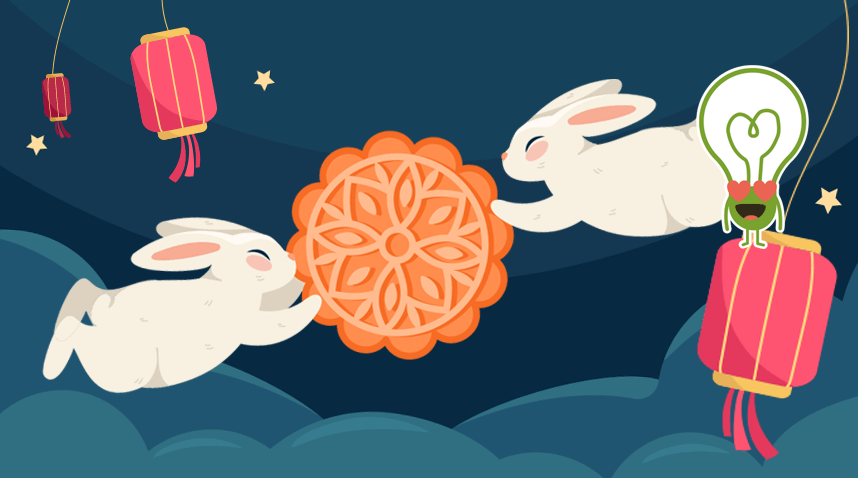It’s Mid-Autumn Fest! What can Chinese V Day teach us about love? Kyle unpacks some lessons he has learnt through his life’s journey and shines a light on how we can look at lanterns differently.
With the Mid-Autumn Festival (Chinese Valentine’s Day) in full swing coupled with the Korean and Thai drama series I’ve been watching lately, I can’t help but ponder the four-letter word (not the infamous word that starts with the letter F) that we all feel but may not fully comprehend – LOVE.
Love’s Complexity and Tragedy

As a 44-year-old man, I know I should better understand love, but I’ve never had a relationship (let alone an exciting one) or a boyfriend.
Instead, the only ‘exciting’ things I have experienced were tragedies. I’ve experienced insecurity about my body, battled cancer, and struggled with my queer identity. I often wonder what I’m missing out on without a special someone to love or be loved by. Pondering deeper, maybe it is better to focus on what I have and can experience rather than what I am lacking in my life
Exploring love through Buddhism
In the Buddhist community, we often hear about love through the concept of loving-kindness (Metta). The root word of Metta is ‘Mitta’ which means friend. The feeling of friendliness is probably the easiest way to grasp this concept and the fuzzy & warm feeling it entails.
Metta is not to be confused with compassion. Compassion is associated with a willingness to comprehend the pain of others and support them in their hardships.
While this is an important trait and another of the Four Divine States of Buddhism (Four Brahmaviharas), it’s not what loving kindness is.
I especially love how the Buddha used the term “loving-kindness” rather than just “Love” alone. Love that is expressed in conjunction with kindness. This got me thinking about how kindness and love can be intertwined.
Why Love Needs Kindness
While kindness is selfless, I’ve observed that loving someone or being loved seems to come with an expectation of something in return. Couples argue about not giving each other enough time/effort/love and this makes me curious about what Buddha meant by loving-kindness.
The concept of loving-kindness in Buddhism is often associated with the idea of cultivating compassion for all beings, regardless of their relationship to us. In the Metta Sutta, there is a passage that says
“Let none deceive another,
Or despise any being in any state.”
“Let none through anger or ill-will,
Wish harm upon another.”
After reading this passage, it’s important to understand that loving kindness isn’t simply about being kind to certain people or only one’s friends or family. It requires one to be free of harmful thoughts and extend that kindness to all beings. Yes, this extends even to the uncle/auntie who keeps asking you when are you getting married.
Although this seems hard, practising this kind of love can be both selfless and unconditional. We often underestimate the capacity to what extent one can practice loving-kindness selflessly and unconditionally. Consistently practising the art of unconditional love is possible and rewarding!
Practising loving-kindness allows us to be more open-minded, making room for opposing views and emotions while reducing our egocentric tendencies.
By doing so, we become resilient to negative experiences and are less likely to be impacted by them.
Be like earth
Like the earthy ground we walk on – it endures all kinds of waste, from trash to urine to water. Despite this, it never complains. Instead, it gracefully absorbs and transforms what it’s given into something nourishing.
Is there anything more loving or kind to oneself than the freedom that comes from not carrying the negative thoughts?
The Power of Meditation and Mindfulness in Cultivating Loving-Kindness

Mindfulness and meditation are powerful practices that can help cultivate a sense of loving-kindness.
Meditation promotes mindfulness, which in turn raises awareness and dispels our attachment to certain views or ignorance. Mindfulness involves being fully present in the moment, without judgment or distraction, and meditation can help achieve this state by training the mind to focus and quiet the chatter of thoughts.
When we are mindful, we can better appreciate the beauty of the present moment and connect with ourselves and others.
Through the loving-kindness meditation I’ve experienced, I can cultivate a sense of loving kindness towards ourselves and others. This involves recognizing the inherent worth and dignity of all beings and wishing them happiness, health, and peace.
By practising loving kindness regularly, we can become more empathetic, patient, and understanding towards others, and develop a greater sense of inner peace and contentment.
Incorporating goodness into our daily routine
Incorporating acts of kindness and compassion into our daily routines is not only beneficial for those who receive them, but it can also have a positive impact on the giver.
Imagine if this is how we express our love daily, how much worthy love can be in pursuing?
When we intentionally send loving kindness to those around us, we are more inclined to treat them with kindness and compassion. This can foster more peaceful and harmonious relationships, improve communication, and increase empathy.
Moreover, the pursuit of loving kindness can have a broader societal impact. When more individuals practice loving kindness, it can create a ripple effect of kindness and compassion, leading to a more compassionate and peaceful society.
Ultimately, you can’t break up with the loving-kindness you have shared with others, can you?
As a single and fabulous 🙂 44-year-old gay man, I’ve come to realize that I don’t need to find love or a partner to feel fulfilled.
Instead, I’ve found a way to love the world around me, rather than simply loving a selected few.
As I strolled down the street, I couldn’t help but admire the stunning lanterns adorning the decorations. It dawned on me that this is what the mid-autumn festival is truly about – the lanterns symbolize inclusivity, shining their light equally for everyone. Whether you’re single or in a relationship, it doesn’t matter.
The design or shape of the lanterns is irrelevant; The soft glow of the lantern can also represent the gentle warmth of human kindness, spreading light and love in the midst of darkness.
Nurturing a sense of loving-kindness requires deep introspection and healthy connections with others.
It’s a lifelong journey that can enrich our lives in countless ways.
By embracing kindness, and empathy, and opening our hearts, we can gain a better understanding of ourselves and our place in the world. At last, I just want to say I love you too.
The best ‘mooncake’ we can give ourselves
Just like mooncakes, people prefer different types of mooncakes. Being okay with your own mooncake’s shape and flavours and those that surround you can make you a lantern in a world that can seem dark.
Nurturing a sense of loving-kindness requires deep introspection and healthy connections with others.
It’s a lifelong journey that can enrich our lives in countless ways.
By embracing kindness, and empathy, and opening our hearts, we can gain a better understanding of ourselves and our place in the world. I just want to say I love you too.
Wise Steps:
- Practice Loving-Kindness Meditation: Regularly meditate on kindness to enhance empathy and understanding in relationships.
- Perform Daily Acts of Kindness: Extend intentional acts of kindness to others, promoting better communication and empathy.
- Embrace Inclusivity: Focus on spreading warmth and love to all, regardless of your relationship status, and find fulfilment in loving the world around you.


